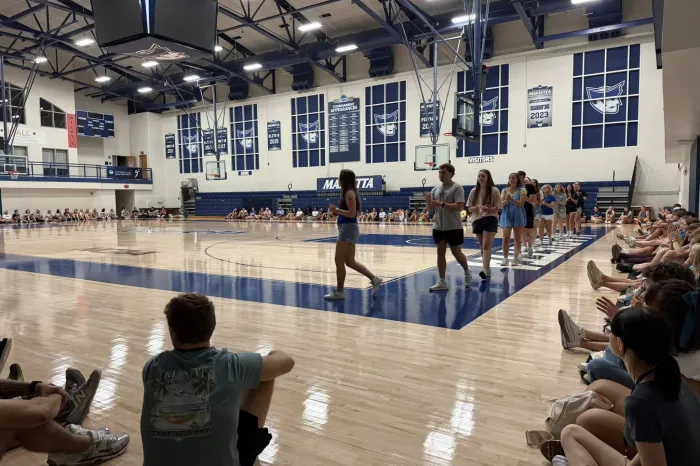
Just over one month ago, 168 Pioneers took their first steps onto Marietta College’s campus. However, unlike other students, their first-year experience included something more than just matriculating — they became members of the 39th EXCEL cohort, continuing the long line of Leadership scholars at the College.
As members of the McDonough Leadership Center, all incoming students must go through the Experience Community Engagement and Leadership (EXCEL) workshop — a week-long, student-run event designed to integrate new students into the department and kickstart the journey of finding their leadership style.
According to Director of Leadership Development Dr. Tanya Judd, staff members originally led the workshop, but she advocated for the transformative nature of student leadership for both first years and returning students. Under her direction, 2007’s EXCEL introduced the student coordinator and assistant coordinator roles, and the experience has been student-run since.
The workshop is one of growth in all areas, with built-in collaboration, self-realization, and a service component. Overall, the program ties into the curriculum represented in the Leadership Center, both for those leading it and for those experiencing it.
“The cohort system introduces students to each other and allows them to bond with the peers they’ll be around for four years,” said Dr. Amy Elliott, Interim Dean of the McDonough Center for Leadership and Business. “EXCEL involves a lot of discussion and provides a space for students to begin appreciating others’ standpoints.”
Lexi Sabatino '26 and AnnaBelle Hacker '27, the coordinators for this year’s workshop, noted its connection to the Five Components Model — a way of conceptualizing the leader-follower dynamic created by former Leadership Center professors Dr. Robert M. McManus and Dr. Gamaliel Perucci.
“It’s one of the first things you learn, but it can really be tied to everything that you do,” Sabatino explained. “For AnnaBelle and I, it’s kind of everything. We have to think, ‘what’s the vibe of this group of students like?,’ because it’s different every year. Being able to lean on the Components model is important because their vibe changes how EXCEL goes every year, and we have to adjust to the culture and context of the group to give the students the best time that we can.”
Both student leadership and their staff advisors cited EXCEL’s focus on discussion as the place of most growth for incoming leadership students. Dr. Judd found that despite the cohort’s size, their community meetings at the end of each day still featured depth and reflection on their experiences.
“Reflection is what creates leadership development,” Dr. Elliott explained. “When these new students go back to small group time, that’s where that reflection takes place.”
Since the fall semester began, Cohort 39 has settled into the swing of academic life. 113 of the original 168 students enrolled in the first of many leadership courses — Foundations of Leadership. As one of the professors teaching sections of the course, Dr. Elliott noted their demeanor being different from previous cohorts.
“Overall, my students are more communicative and more engaged in class than I’ve seen in the last few years. You notice it in the classroom, in their willingness to speak up — to answer questions, to ask questions,” she said.
Sabatino and Hacker remarked that the first years’ engagement spread outside the classroom as well, including a desire to lead future EXCEL programs before even finishing their own.
“When the freshmen first start experiencing the week, they very much look up to their small group leaders, and then by the end of the week, the leaders are learning more from the EXCELers than the other way around, which I think is really cool,” Hacker said.
When asked about the spirit behind the workshop, Dr. Judd noted a specific question she posed during the coordinator interviewing process — namely, what they wanted to do differently.
“What I never want EXCEL to be is the same as it was two years ago, or three years ago. I think the value of it is just as much for the growth of the leaders as it is for the incoming freshmen. I want it to be constantly evolving to meet the needs of the students that are coming in and the needs of the leaders that are putting their love and faith into the program.”